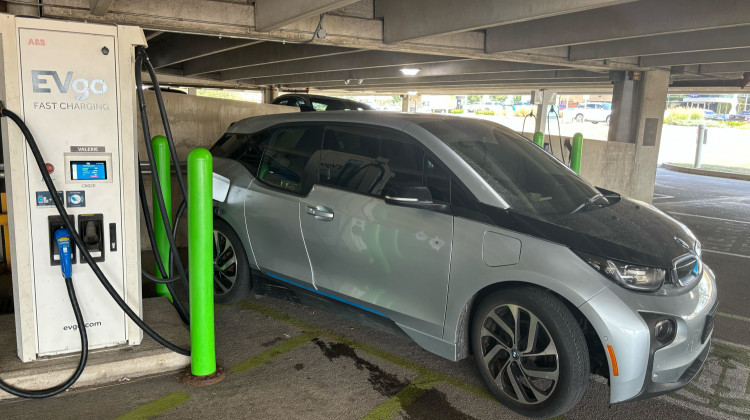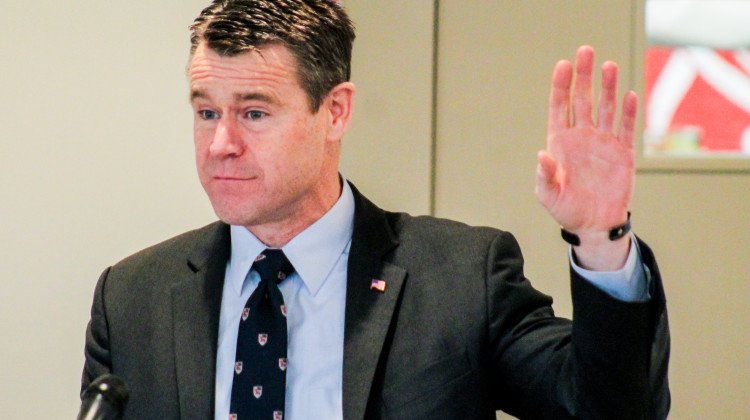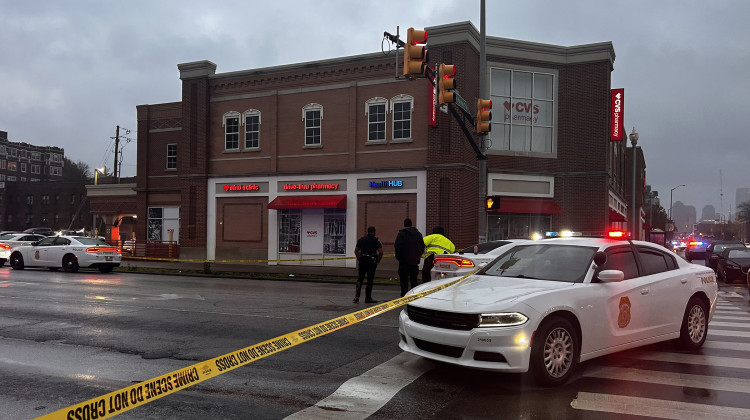
Car refueled at an electric vehicle charging station in Indianapolis. The city will receive $15 million in federal grants to increase public access to electric vehicle charging stations throughout the community.
Abriana Herron / WFYIIndianapolis will receive $15 million in federal grants to increase public access to electric vehicle charging stations throughout the community. The announcement was made by the U.S. Department of Transportation this week as a part of the Biden-Harris Administration’s goal to support EV infrastructure growth throughout the nation.
The project prioritizes closing gaps within the Indiana Department of Transportation’s Electric Vehicle Infrastructure Plan by adding more EV chargers throughout Indianapolis and placing them in disadvantaged areas.
“The City of Indianapolis is excited to work with our State and Federal partners to bring EV technology to our neighbors most impacted by environmental injustice,” Mayor Joe Hogsett said in a statement Wednesday. “There is no doubt that transportation infrastructure has, historically, placed undue burdens on minority communities in American cities.”
INDOT’s EV plan was approved in 2022 by the federal government. In March of this year, INDOT announced the location of 39 statewide charging stations. Indianapolis and surrounding areas will house six of the chargers.
The grant announcement comes after a racial justice alliance – the Indiana Alliance for Equity, Diversity, and Inclusion of Electric Vehicle Infrastructure and Economic Opportunities – recently called for a more equitable approach to the state’s EV plan. They cited concerns with transparency, public engagement and the selection of the charging sites.
Denise Abdul-Rahman is a leader with the alliance and the environmental climate justice chair with the Indiana NAACP.
“Since we host most of the air pollution, we should also reap all of the benefits of the reduction of air pollution and greenhouse gasses,” she said.
For the past 2 years, the racial justice group has worked to make sure EV implementation is equitable throughout Indiana. In a previous interview, Abdul-Rahman said INDOT “did just enough” to meet Justice40 initiative criteria – mandates from the Biden-Harris Administration stating that “at least 40% of the benefits of certain federal investments must flow to disadvantaged communities to catalyze environmental justice.”
The city has partnered with the EV alliance to ensure the grant disbursement includes input from minorities in the community.
Rev. David Greene is the president of the Concerned Clergy of Indianapolis, which is part of the alliance. He said they are “excited to know that charging fuel infrastructure funding is coming to the capital city.”
“While electric cars are more efficient, we believe that we must create a better environment for our urban centers,” he said in a statement. “Clearly, the time is right for electric cars – in fact, the time is critical.”
The transportation sector is a main contributor to Indianapolis’ carbon emissions, and the adoption of EV infrastructure can help reduce emissions and improve pollution in the city. The Thrive Indianapolis Plan states the city has committed to carbon neutrality by 2050.
Abdul-Rahman said the federal grant will not only curb carbon emissions and potentially improve health outcomes for all Indianapolis residents, but it will also create good paying jobs for the community.
“We plan to create a pipeline for those that can be able to provide the maintenance of these EV charging stations,” she said. “We also will have some training components, where people can be trained for these job opportunities.”
In the 2023 Thrive Indianapolis annual report, it states the city has exceeded its 2025 target goal for the number of registered EV’s.
Contact WFYI Morning Edition Newscaster and Reporter Abriana Herron at aherron@wfyi.org.
 DONATE
DONATE






 Support WFYI. We can't do it without you.
Support WFYI. We can't do it without you.